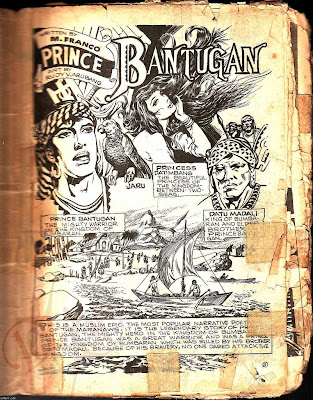Filipino Muslim Literature is an inventory of diverse cultures that displays features and cultures of the Muslims in the Philippines. These
distinctions distinguish one Muslim cultural community from another.
Yet, all these communities are unified by their Islamic faith, which has
already pervaded many aspects of their folk literature since Islam is a
way of life. Regardless of cultural community, all Filipino Muslims
belong to one Ummah Muslimah. Yet, it has been distinguished as Filipino Muslim Literature so as to differentiate it from other Muslim countries that have different cultures from us.
In
general, the folk literature of Muslim cultural communities in
Mindanao, the Philippines, may be in prose or in verse. But the style
and form of expression may vary from one Muslim cultural community to
another, what with the various languages that the people speak. These
oral literary forms may be didactic, hortatory, entertaining,
instructive, or informative.
 Folk literature in Mindanao Muslim cultural communities as in other
Filipino groups follow the oral tradition in that folktales, myths,
legends, epics, poems, riddles and proverbs are handed down by word of
mouth from generation to generation. Moreover, as is true of folk
literature of other people, folk literature in the Muslim cultural
communities has a participatory audience. The audience listens, reacts,
and retells what he or she hears to another audience, thereby ensuring
the transmission of the folk literary material to others. Authorship is
not individual; it is collective. Apparently, what the Muslim cultural
communities must build and develop eventually is a body of written
literature just like other Filipinos.
Folk literature in Mindanao Muslim cultural communities as in other
Filipino groups follow the oral tradition in that folktales, myths,
legends, epics, poems, riddles and proverbs are handed down by word of
mouth from generation to generation. Moreover, as is true of folk
literature of other people, folk literature in the Muslim cultural
communities has a participatory audience. The audience listens, reacts,
and retells what he or she hears to another audience, thereby ensuring
the transmission of the folk literary material to others. Authorship is
not individual; it is collective. Apparently, what the Muslim cultural
communities must build and develop eventually is a body of written
literature just like other Filipinos.
EPICS
Epics
in most Muslim cultural communities are yet to be found, collected,
identified, and consequently documented. Apparently, this sad reality is
spawned by the lack of informants or tellers. It could also be due to
the absence of enterprising researchers. In other communities, epic
bearers have died or have moved to another place as a result of the
deterioration of peace and order and other reasons.
An Epic of Maranao
Prince Bantugan
Bantugan
is an epic story told in the great oral tradition of the Maranao tribe.
It is a story about the great Prince Bantugan, the greatest warrior of
the kingdom of Bantugan.
 In the play, Bantugan, after courting the beautiful but evil sorceress
of Bambalay Anonan, Maginar , decides to return home to Bumbaran. Upon
his return he finds out that his brother and king of Bumbaran, Agaanon
Dalinan, driven by his jealousy over the prince warrior's fame, has ordered
out a proclamation which forbids all the people of Bumbaran from speaking
to him. Deeply saddened, Prince Bantugan departs from his beloved land.
In the play, Bantugan, after courting the beautiful but evil sorceress
of Bambalay Anonan, Maginar , decides to return home to Bumbaran. Upon
his return he finds out that his brother and king of Bumbaran, Agaanon
Dalinan, driven by his jealousy over the prince warrior's fame, has ordered
out a proclamation which forbids all the people of Bumbaran from speaking
to him. Deeply saddened, Prince Bantugan departs from his beloved land.
While traveling, he is accidentally placed under a spell by the vengeful
Maginar. He falls lifeless in the Land-Between-Two-Seas where the beautiful
Princess Datimbang finds him. The question of the corpse's identity
puzzles everyone until Bantugan's faithful parrot, who has been looking
for him, finds him in his lifeless state. Fearing that the kingdom might
be held responsible for the great warrior's death, the king of the Land-Between-Two-Seas
decides to ship Bantugan's body back to Bumbaran. He sends out a
parrot in advance to tell of the prince's fate. The news of his death
quickly spreads, reaching the ears of Miskoyaw, Bantugan's mortal enemy,
who decides to finally invade Bumbaran.
Meanwhile, Prince Madali and Prince Mabaning of Bumbaran, loyal friends of the great prince, upon hearing the sad news, decide to go to the heavens to retrieve Bantugan's soul from the Angel of the Death. Prince Mabaning, posed as a young beautiful woman, seduces the Angel of Death into telling him where he keeps all the souls of the dead, including that of the dead prince.
Successful with the bottle of Bantugan's soul in hand, the two princes
race back to Bumbaran just in time for Bantugan's funeral. They open the
bottle and almost instantaneously, and much to the amazement of those present,
Bantugan awakes from his lifeless slumber. Mourning quickly turns into
celebration as everyone greets Bantugan's return to the land of the living,
including his brother, the king, who asks for his forgiveness . Bantugan
is also greeted by Princess Datimbang, who he vaguely remembers as the
beautiful woman who treated him kindly before his death. Their eyes meet,
and Bantugan quickly falls in love.
But amidst the celebration, Miskoyaw enters with his evil cohorts. Seeing
Bantugan well and alive, he orders his soldiers to attack. Bantugan soon
takes care of the odds and faces Miskoyaw. They do battle. When the
dust clears, Bantugan appears victorious standing over Miskoyaw's corpse.
And
peace rules over the kingdom of Bumbaran...


